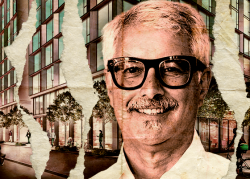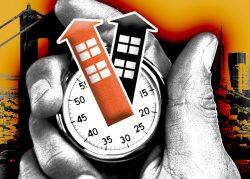A rejection by San Francisco’s Board of Supervisors of 495 homes approved at a Nordstrom parking lot became a symbol of city red tape. Now Gov. Gavin Newsom backs its construction.
The governor has approved using a recent state law to speed up the resolution of any future legal challenge to the proposed project at 469 Stevenson Street in South of Market, the San Francisco Chronicle reported.
The city’s Planning Commission in June 2021 approved a plan by San Francisco-based Build for the 27-story, 495-unit apartment tower on the lot between Market, Fifth, Mission and Sixth streets.
Four months later, the supervisors blocked the project by demanding new environmental studies, which prompted a state probe into the city’s glacial housing approvals.
Newsom has now dubbed 469 Stevenson a state Environmental Leadership Development Project.
This means that once the project’s formal environmental impact report is approved, if a lawsuit challenging it is filed, the state appeals court must settle it within 270 days.
The state intervention could set a precedent across California that goes beyond a single parking lot development, according to the Chronicle.
Any housing proposal with a price tag above $15 million can apply for a similarly streamlined appeal process. Certification is granted if a set number of the units in the building are priced at affordable levels and the project can show clear environmental benefits.
“This reduces the risk of a protracted litigation,” said Steven Vettel, an attorney for Build. “Without this certification, you can be stuck in a three-year cycle. And time is money.”
To get the state OK for fast-tracking any environmental appeals, a project must be built with union labor. It needs to be developed to national standards of sustainability and operate in a way that limits greenhouse gas emissions.
The plans for 469 Stevenson meet both criteria, according to the state’s Office of Planning and Research. The high-rise would include at least 65 units for lower-income residents.
“We don’t have enough housing and we need to cut greenhouse gasses,” said Jason Elliott, Newsom’s top housing advisor. “This doesn’t just apply to San Francisco.”
The program builds on a decade-old state initiative to apply similar time limits to large projects. This limits the ability of litigious opponents to use the California Environmental Quality Act to send high-profile projects into legal or regulatory limbo.
Newsom signaled his desire to broaden that initiative’s impact during his State of the State address in 2019. A bill allowing it became law in 2021.
Build was the first in the state to apply to use the expanded bill after its project became a flash point showing how the political process in San Francisco can be used to derail housing projects with drawn-out reviews and appeals.
Activist groups in SoMa appealed 469 Stevenson to the Board of Supervisors after the Planning Commission signed off, demanding that the environmental impact report be broadened to take in such topics as gentrification. The board went along on an 8-3 vote, even though social issues aren’t part of standard environmental reviews.
The delaying tactic led to the first-ever housing policy probe by the state Department of Housing and Community Development, with the investigation still active. San Francisco has the longest entitlement process in the state, at an average 1,000 days.
The 469 Stevenson project is set to go to the Planning Commission for certification on April 20. Opponents would have 30 days to appeal a re-certification to the Board of Supervisors.
— Dana Bartholomew
Read more



